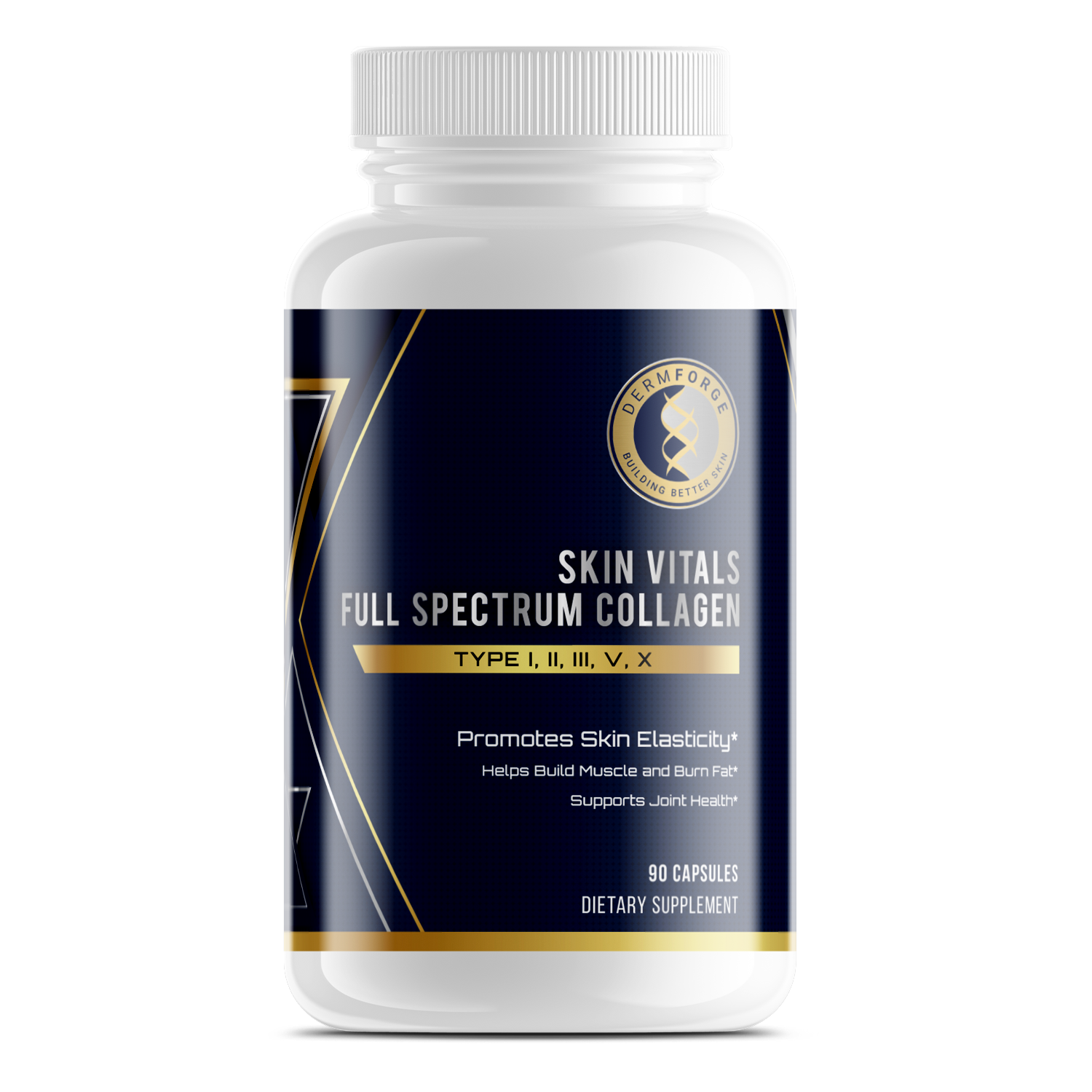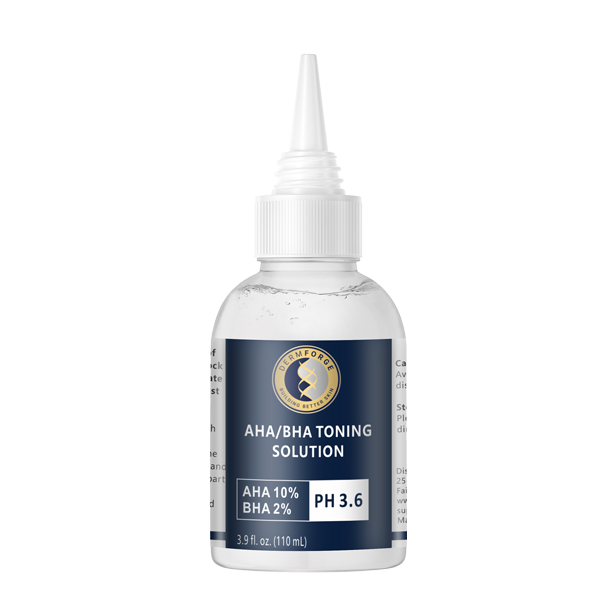Collagen is an essential protein that supports the structure and integrity of our skin, joints, bones, and other connective tissues. As we age, however, our bodies gradually produce less and less collagen, leading to visible signs of aging and reduced overall health. In this article, we will explore the science behind collagen production, the factors that influence its synthesis, the signs of decreased collagen production, the consequences of a collagen deficiency, and effective ways to boost collagen production.
The Science Behind Collagen Production
To understand why collagen production decreases over time, it is important to first grasp collagen's role in the body. Collagen is the most abundant protein in our body, accounting for about one-third of the total protein composition. It provides strength, elasticity, and support to various tissues in our body, including the skin, joints, tendons, ligaments, and muscles.
Collagen is produced by specialized cells called fibroblasts and is found throughout the body. These fibroblasts synthesize collagen through a complex process involving converting amino acids into collagen molecules. Various enzymes and biological factors regulate this synthesis process.
The Role of Collagen in the Body
Collagen is the "glue" that holds our body together. It provides structural support to our skin, giving it strength and elasticity. In addition, collagen helps maintain the integrity of our joints, promoting their smooth movement and preventing friction between bones. Collagen also plays a crucial role in bone health, contributing to the structure and stability of our skeletal system.
The Process of Collagen Synthesis
Collagen synthesis begins with the production of procollagen, a precursor to collagen. This procollagen is then modified within the endoplasmic reticulum of fibroblasts, resulting in the formation of tropocollagen molecules. These tropocollagen molecules are then organized into fibrils, which form the building blocks of collagen fibers. Finally, these collagen fibers are assembled into larger structures, providing strength and elasticity to the tissues they support.
But what happens when collagen production starts to decline? As we age, the natural collagen production in our body gradually decreases. This decline can be attributed to various factors, including genetic predisposition, lifestyle choices, and environmental factors. As a result, the collagen levels in our skin, joints, and other tissues diminish.
When collagen production decreases, the skin loses its firmness and elasticity, leading to wrinkles and sagging. Joints may become less flexible and more prone to stiffness and discomfort. The structural integrity of bones may also be compromised, increasing the risk of fractures and osteoporosis.
Fortunately, there are ways to support collagen production and maintain its levels in the body. A healthy diet rich in protein, vitamins, and minerals can provide the necessary building blocks for collagen synthesis. Additionally, lifestyle habits such as avoiding excessive sun exposure, quitting smoking, and managing stress can help preserve collagen levels.
Furthermore, advancements in medical research have led to the development of collagen supplements and treatments that can stimulate collagen production in the body. These interventions can help improve skin elasticity, reduce joint pain, and promote overall well-being.
Understanding the science behind collagen production is crucial for maintaining optimal health and vitality. By appreciating the role of collagen in our body and implementing strategies to support its synthesis, we can enhance our tissues' strength, flexibility, and resilience, ensuring a healthier and more vibrant life.
Factors Influencing Collagen Production
While collagen synthesis is a natural process in our bodies, several factors can influence the rate at which it occurs. Understanding these factors can shed light on why collagen production diminishes over time.
Age and Collagen Production
As we age, the natural production of collagen begins to decline. Starting in our late 20s or early 30s, collagen synthesis gradually decreases, resulting in visible signs of aging such as wrinkles, sagging skin, and joint stiffness. This decline is primarily due to decreased fibroblast activity and a slower turnover of collagen molecules.
But why does collagen production decrease with age? Our bodies undergo a natural aging process that affects collagen production. The fibroblasts, responsible for producing collagen, become less active as we age.
Additionally, the turnover of collagen molecules slows down, making it harder for new collagen to replace the old and damaged collagen. This combination of factors contributes to the gradual decline in collagen production and the subsequent signs of aging in our skin and joints.
Furthermore, hormonal fluctuations can also affect collagen production. Estrogen, for example, plays a vital role in maintaining the quality and quantity of collagen. As estrogen levels decline during menopause, collagen production can be further hindered. This hormonal shift can lead to a more rapid decline in collagen synthesis, exacerbating the visible signs of aging.
Lifestyle and Its Impact on Collagen
Various lifestyle factors can impact collagen production and contribute to its decline. One significant factor is exposure to the sun's ultraviolet (UV) radiation. UV rays break down collagen fibers, leading to accelerated collagen loss and premature skin aging. So, if you spend a lot of time in the sun without proper protection, you may unknowingly damage your collagen and speed up the aging process.
But it's not just sun exposure that can harm collagen. Unhealthy lifestyle choices can also have a negative impact. For instance, smoking has been shown to impair collagen synthesis and degrade the existing collagen structure. Additionally, a diet high in sugar and processed foods can lead to chronic inflammation, further hindering collagen production. Excessive alcohol consumption can also contribute to collagen degradation, as alcohol interferes with the body's ability to produce collagen.
Conversely, adopting a healthy lifestyle can help promote collagen production. Regular exercise, for example, stimulates collagen synthesis and improves the overall health of our skin and joints. A balanced diet rich in fruits, vegetables, lean proteins, and antioxidants provides the necessary nutrients for collagen production.
Adequate hydration is essential, as collagen relies on water to maintain its structure and function. Lastly, proper skin care, including moisturizers and sunscreen, can help protect existing collagen and prevent further damage.
By understanding the factors influencing collagen production, we can make informed choices to support and maintain healthy collagen levels. While we cannot stop the natural aging process, we can take steps to slow down the decline and keep our skin and joints looking and feeling their best.
Signs of Decreased Collagen Production
Reduced collagen production manifests in various physical indicators and internal symptoms, highlighting the importance of maintaining healthy collagen levels.
Collagen, the most abundant protein in the human body, is crucial in maintaining the structural integrity of our skin, bones, joints, and connective tissues. Our natural collagen production decreases as we age, leading to noticeable effects on our overall health and appearance.
Physical Indicators of Collagen Loss
One of the most obvious signs of decreased collagen production is the appearance of fine lines, wrinkles, and sagging skin. Collagen loss leads to a loss of skin elasticity, making it prone to wrinkles and drooping. Additionally, the skin may become thinner and more fragile, making it more susceptible to bruising and injury.
Furthermore, reduced collagen levels can impact the health and appearance of nails and hair. Brittle nails and thinning hair are common indications of collagen deficiency. Collagen is essential for maintaining the strength and resilience of our hair and nails, and its decline can result in noticeable changes in their texture and quality.
Internal Symptoms of Reduced Collagen
While the external effects of decreased collagen production are readily visible, there are internal symptoms that may go unnoticed. Joint stiffness, decreased mobility, and an increased risk of developing joint-related conditions such as osteoarthritis are often linked to collagen depletion. Decreased bone density and an increased risk of fractures are potential consequences of decreased collagen levels.
Moreover, collagen plays a crucial role in supporting the health of our digestive system, blood vessels, and organs. A decline in collagen production can affect the integrity of the gut lining, leading to digestive issues such as leaky gut syndrome. It can also impact the elasticity of blood vessels, potentially contributing to cardiovascular problems. Maintaining optimal collagen levels is essential for overall health and well-being.
The Consequences of Ceased Collagen Production
When collagen production ceases, the impact on our health and well-being can be significant. The consequences of collagen deficiency are most evident in three key areas: skin health, joint and bone health.
Effects on Skin Health
Collagen loss results in the skin's supportive structure breakdown, leading to thinning, sagging, and wrinkle formation. Skin becomes less resilient and more prone to damage from environmental factors such as UV radiation and pollution. The vibrancy and youthful appearance of the skin diminishes, and the skin loses its ability to retain moisture, resulting in dryness and dullness.

Impact on Joint and Bone Health
Collagen is a crucial component of our joints and bones, providing strength and cushioning. Decreased collagen production compromises joint function, leading to stiffness, pain, and an increased risk of developing joint disorders such as osteoarthritis. Similarly, decreased collagen levels weaken bone structure, making them more susceptible to fractures and osteoporosis.
Ways to Boost Collagen Production
Despite the natural decline in collagen production with age, several strategies can help stimulate collagen synthesis and maintain healthy collagen levels in the body.
Nutritional Interventions for Collagen Production
Eating a balanced diet rich in specific nutrients can provide the building blocks necessary for collagen synthesis. Foods high in vitamin C, such as citrus fruits, strawberries, and bell peppers, promote collagen production by supporting the enzymes involved in collagen synthesis. Consuming foods rich in amino acids, especially proline and glycine found in lean meats, bone broth, and legumes, can also contribute to collagen production.
Additionally, incorporating foods rich in antioxidants, such as berries, leafy greens, and nuts, can help protect collagen from damage caused by free radicals.
The Role of Supplements in Collagen Production
Supplements targeted at supporting collagen production have gained popularity in recent years. Collagen peptides, derived from animal sources, contain amino acids that act as building blocks for collagen synthesis. These supplements are available in powder or capsule form and can be easily incorporated into daily routines.
Other supplements, such as vitamins C, and E, and hyaluronic acid, can support collagen production and help maintain healthy levels. However, consulting with a healthcare professional before starting any new supplement regimen is important.
Conclusion
Collagen production naturally diminishes as we age, leading to visible signs of aging and reduced overall health. Understanding the science behind collagen synthesis and the factors influencing its production allows us to make informed lifestyle choices to support optimal collagen levels. By adopting a healthy lifestyle, identifying the signs of decreased collagen production, and incorporating nutritional interventions and supplements, we can minimize the consequences of ceased collagen production and promote healthier skin, joints, bones, and overall well-being.
Ready to reclaim firmer, more youthful-looking skin? Explore DermForge’s collection of skincare solutions, including high-dose collagen supplements, to help tighten sagging skin. Shop now and take the first step toward a firmer, more radiant appearance.






